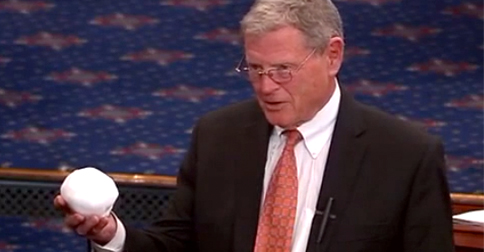Associated Press Changes Style Guide For Climate Change Doubters

By:
The Associated Press just changed its stylebook to now recommend that people who deny the existence of climate change (or at least human-made climate change) be called "climate change doubters" or "those who reject mainstream climate science."
That's a problem. Here's why.
The AP is a news agency that is published by more than 1,700 newspapers and about 5,000 television and radio broadcasters. Many news companies adhere to the AP stylebook as if it were their Bible. When the AP tells journalists it is correct to call people who deny the existence of climate change "doubters," it gives off the feeling that there is no consensus among scientists that man-made climate change is happening, however, there is a consensus.
Before Tuesday, AP referred to people who reject climate change as "deniers" or "skeptics."
RELATED: This Comic Reveals the Real Reason People Deny Climate Change
"It's gotten to the stage where evidence for climate change is so overwhelming that it's not really, in terms of the facts, reasonable to be a denier," Christopher B. Field, director of the Carnegie Institution's Department of Global Ecology at Stanford University, told ATTN:.
Field said there is a real debate about how to act on climate change and what might be the economic cost of acting or not acting, but almost every scientist believes it is happening and that humans have influenced it.
"There are many different kinds of climate change skeptics, and my impression is most of the climate change skeptics now are skeptical about the economics or feasibility of action," he said. Field believes the AP is responsible for accurately characterizing people's viewpoints, but he wasn't sure if calling them climate change "doubters" is the right terminology or not.
In a recent move by one person trying to disprove separate NASA and National Oceanic and Atmospheric Administration studies, Sen. James Inhofe (R-Okla.), brought a snowball with him to Senate proceedings in January. Inhofe showed off the snowball that day—and even tossed it up to the rostrum—to support his argument that climate change is a hoax.

The fact is: Science relies on consensus. No scientist will every tell you they are 100 percent sure that anything is factual, but when 99 percent of scientists agree that something is almost certainly true, they stick with it as the accepted idea. Many organizations and studies have claimed there is a consensus among 97 percent of scientists that climate change is real and man-made (including NASA). Many have tried to question this figure, but it has been found to be true by many independent sources.
A study by the National Physical Sciences Consortium found that more than 99 percent of scientists agree that man-made climate change is happening. That figure was found by reviewing more than 24,000 climate change studies published between 2013 and 2014, which accounts for nearly 70,000 experts who were involved. In that study, only four people did not believe that humans caused climate change.
For the climate scientists who do reject man-made climate change, it's not difficult to see where their interests lie. As was the case with Dr. Wei-Hock Soon, who politicians repeatedly used as an example of a respected scientist who did not believe in climate change. The millions of dollars it appears he received from the fossil fuel industry likely skewed his data.
Scientists, however, have been pointing out climate change for decades, long before any industry could even afford to fund their research, and companies such as Exxon knew it could be a problem as early as the 1970s. Similar to how Big Tobacco tried to cover up the fact that cigarettes cause cancer, Big Oil is trying to shift the conversation away from climate change (and they even use the same experts).
